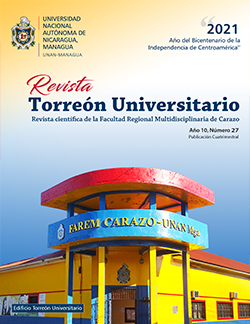CYP2C9 and VKORC1-1639 genetic polymorphisms involved in warfarin pharmacogenetics and pharmacodynamics in Latin American population
DOI:
https://doi.org/10.5377/torreon.v10i27.10842Keywords:
warfarin, CYP2C9, VKORC1-1639, polymorphismAbstract
Warfarin is the most common anticoagulant used worldwide for prevention and treatment of thromboembolic events. Polymorphisms in the CYP2C9 and VKORC1 -1639 genes have been associated with variability in the response to warfarin in several populations. The aim of this research is to determine the frequency of these polymorphisms in Latin American population. The identification of the presence of polymorphisms can guarantee the safest and most effective use of warfarin by predicting the appropriate dose for each patient.
We included eleven studies with frequency data of genetic polymorphisms in 2,830 Latin American patients. The allelic variants CYP2C9 *1 / *2 and CYP2C9 *1 / *3 were more frequent in the study population, with 13.15% and 6.93% respectively. The allelic variant *3 / *3 was present in 0.17%. As for the polymorphisms of the VKORC1 -1639 gene frequencies of 49.11%, 33% and 17% were reported for the GA, GG and AA variants respectively.
Frequency of the allelic variants in the genes CYPC9 and VKORC1, in the Latin American population, allows to establish starting points to suggest the genotypes that should be evaluated before the indication of the warfarin dose. Comparing the frequency of polymorphisms in the CYP2C9 and VKORC1 -1639 genes in the Latin American population with other populations, similarities are observed with the populations of origin.
Downloads
Downloads
Published
How to Cite
Issue
Section
License
Los autores que publican en esta revista están de acuerdo con los siguientes términos.
- El autor o los autores de los artículos, ensayos o investigaciones conceden a la Universidad Nacional Autónoma de Nicaragua, Managua (UNAN-Managua) los derechos de edición (copyright) del trabajo enviado, por consiguiente la Universidad cuenta con el derecho exclusivo para publicar el artículo durante el periodo completo de los derechos de autor.
- Estos derechos de autor/ autores autorizan a la Revista Torreón Universitario y a la Universidad editar y divulgar/publicar el artículo en dicha Revista, incluyendo reproducción impresa y electrónica, el almacenamiento, recuperación y cualquier otro tipo de publicación, y fuentes de información secundaria como servicios de resúmenes y bases de datos, así mismo la facultan a proteger el artículo contra el uso no autorizado para su difusión por medios impresos o electrónicos (PDF, HTML, EPUB, XML u otros).
Licencia para el uso del contenido
La revista hace uso de la Licencia Creative Commons Atribución-NoComercial-SinDerivar 4.0 Internacional.
Bajo esta declaración:

Este revista está sujeta a una licencia de Creative Commons Reconocimiento-NoComercial-SinObraDerivada 4.0 Internacional. Puede ser copiada, distribuida y transmitida públicamente siempre y cuando se cite al autor y la fuente (Revista Torreón Universitario), no debe modificarse ni utilizarse con ningún fin comercial. La licencia completa se puede consultar en http://creativecommons.org/licenses/by-nc-nd/4.0/.

